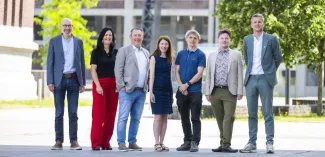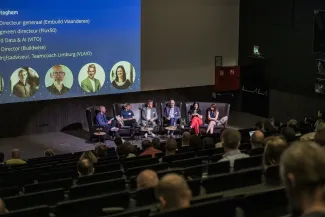Flanders is fully committed to AI as a lever for sustainable innovation in the construction and energy sectors
Flanders is making a firm choice for artificial intelligence (AI) as the driving force behind the transformation of its construction and energy sectors. While pioneering companies are already reaping the benefits of smart applications, many others still face the challenge of implementing AI successfully.
The partners of the European Digital Innovation Hub - Energy in the Built Environment (EDIH-EBE), together with VLAIO and Buildwise, are organising an event today at Thor Park in Genk. Leading voices from VITO, Buildwise, Embuild, Flux50 and VLAIO will share their insights on how Flanders can seize the opportunities offered by AI and what challenges must still be overcome.

(From left to right: Bart Buelens, Head of Department, Data & AI Competence Centre – VITO | Anke Albregts, Business Advisor – VLAIO | Chris Slaets, Managing Director – Embuild Limburg | Caroline Deiteren, Director-General – Embuild Flanders | Frederik Loeckx, General Director – Flux50 | Jan Huysman, Project Manager, Economic Innovation Team – POM Limburg | Pieter Van Geite, IT Director – Buildwise)
AI as a gamechanger for energy and construction
AI technology offers unprecedented potential for both sectors. In the energy sector, AI is essential for managing complex, decentralised networks and integrating renewable energy. Advanced algorithms can predict and optimise energy consumption at the level of individual buildings. In the construction sector, digital twins and automated processes accelerate projects, improve quality and safety, and help address labour shortages through autonomous machinery.
Flanders in a European Context
Flanders boasts strong research centres and innovative companies that are internationally recognised in the fields of digital twins and energy optimisation. However, greater collaboration between companies, research institutions and government is needed to accelerate the market uptake of developed technologies and to reinforce Flanders’ leadership position in Europe.
Challenges: from data to cultural change
One of the biggest hurdles is the availability of standardised, high-quality data. Without accessible datasets, many AI applications remain stuck in the experimental phase. Organisational and cultural factors also play a role. The construction sector, traditionally more conservative, faces a significant challenge where success depends not just on technological investment, but also on a shift in mindset.
For SMEs, high initial investments and a lack of specialised staff present additional barriers — even though they stand to gain the most from AI solutions for process optimisation and predictive maintenance.
Support and ethics
Government support through financial incentives, testbeds and training programmes can make a real difference. At the same time, experts highlight the need for ethical frameworks around data use, transparency, and responsible innovation. AI development must be not only technologically advanced but also socially responsible.
Successful EDIH approach gets a flemish relaunch
The EDIH-EBE has shown that a targeted digitalisation approach for the construction and energy sectors works. Thanks to concrete results and positive feedback from the field, the partners are now working with the other Flemish EDIHs to relaunch the initiative. The most successful activities will be combined into a powerful new Flemish AI EDIH. This new hub will expand to three key domains: construction, energy, and industry. With both European and Flemish funding, governments, knowledge institutions, and businesses are joining forces to accelerate AI innovation. This collaboration strengthens Flanders’ position as a European innovation leader and delivers even greater impact for companies.

“The future of Limburg’s economy lies in digitalisation. Smart technologies such as sensors and energy management systems offer tremendous opportunities to better understand our energy consumption, use energy more efficiently, and thus reduce costs for households and businesses. At the same time, we reduce our ecological footprint and strengthen the stability of the electricity grid. That is why digitalisation is a key focus of our economic future plan, SALKturbo. It’s an investment that pays off — for our economy, our climate, and our society.” - Tom Vandeput, Deputy for Economy and Chair of POM Limburg
AI and digitalisation have become indispensable in the energy and construction sectors — from intelligent control of installations and digital twins of buildings and neighbourhoods to robots on construction sites. At VITO, we use these technologies as drivers of sustainable innovation and a sustainable energy future. Moreover, digitalisation is not just a technical shift. It is a catalyst for innovation, enabling smart infrastructure, improved efficiency, and the real-time adaptability of energy systems.” - Inge Neven, CEO VITO
“Innovation with AI in the construction and energy sectors starts with people: through targeted training, cross-sector collaboration, and strategic investment, we make technology practical, safe, and sustainable.” - Frederik Loeckx, General Manager Flux50
“Digitalisation and artificial intelligence (AI) are key to the future of an innovative construction sector in Flanders. These technologies are not goals in themselves, but they do contribute to a more high-performing sector. That’s why we need a fully-fledged innovation ecosystem around construction that prepares the sector for the future — not only to boost the strength of our construction companies and enhance their competitiveness in Europe, but also to be a vital part of the solution to challenges related to climate, energy, housing, and more.” - Caroline Deiteren, Director-general - Embuild Flanders
“Thanks to this unique ecosystem, we have already been able to support many of our construction companies in their digital transformation and innovation efforts. But if we truly want to make a difference in the construction sector, we all need to shift up a gear.” - Chris Slaets, Manager Director - Embuild Limburg
“Artificial intelligence is not a hype, but a necessary lever for the construction sector. From site safety to failure costs, from design to energy management — AI applications can make a difference at every level. It is up to Buildwise, our partners, and ultimately the market to provide contractors with ready-to-use, tailor-made solutions: applications with AI under the bonnet, but without time-consuming integration into their operations.” - Pieter Van Geite, IT Director – Buildwise
About EDIH-EBE
EDIH-EBE, the European Digital Innovation Hub Energy in the Built Environment, is the central digital and physical access point — a true one-stop hub — for start-ups, SMEs, mid-caps (<3,000 FTEs), and public sector organisations engaged in energy applications in the built environment. The hub is based in Genk and is connected to several other digital innovation hubs across the EU.
Many companies and public sector organisations (such as social housing corporations, cities, and municipalities) involved in energy applications within the built environment are still missing out on innovations and opportunities in digital transformation. A missed opportunity, since in-depth digitalisation offers significant advantages.
It allows companies to improve products, processes, and services, thereby increasing energy efficiency in the construction and renovation of buildings and neighbourhoods. EDIH-EBE was established to help bridge the digital gap in businesses. As a one-stop hub, it offers a range of services to strengthen the digital knowledge, skills, and experience of companies in both the EU and Flanders, giving them a competitive edge.




